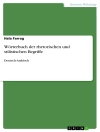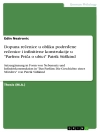Since entering the stage, Davidsonian event arguments have taken on a central role in linguistic theorizing. Recent years have seen a continuous extension of possible applications for them, not only in semantics but also in syntax. At the same time questions concerning the ontological status of events have received renewed attention. This collection of articles provides new evidence for the virtually ubiquitous presence of event arguments in linguistic structure and sheds new light on their nature. The volume is organized into four sections: Events – states – causation; Event nominals; Events in composition; Measuring events.
Mục lục
Contents: I. Events – states – causation: Manfred Bierwisch, The event structure of cause and become. – Stefan Engelberg Stativity, supervenience, and sentential subjects. – Anita Mittwoch, Do states have Davidsonian arguments? Some empirical considerations. – Kay-Eduardo González/Eva-Maria Remberger, Ser and estar. The syntax of stage level and individual level predicates in Spanish. – Horst Lohnstein, Sentence connection as quantificational structure. – II. Event nominals: Artemis Alexiadou, Gerund types, the present participle and patterns of derivation. – Ingrid Kaufmann, Referential arguments of nouns and verbs. – III. Events in composition: Angelika Kratzer, Building resultatives. – Daniel Hole, Reconciling >possessor< datives and >beneficiary< datives. Towards a unified voice account of dative binding in German. – Werner Abraham, Event arguments and modal verbs. – IV. Measuring events: Patrick Caudal/David Nicolas, Types of degrees and types of event structures. – Regine Eckardt, Too poor to mention. Subminimal events and negative polarity items. – Kimiko Nakanishi, Semantic properties of split topicalization in German.












